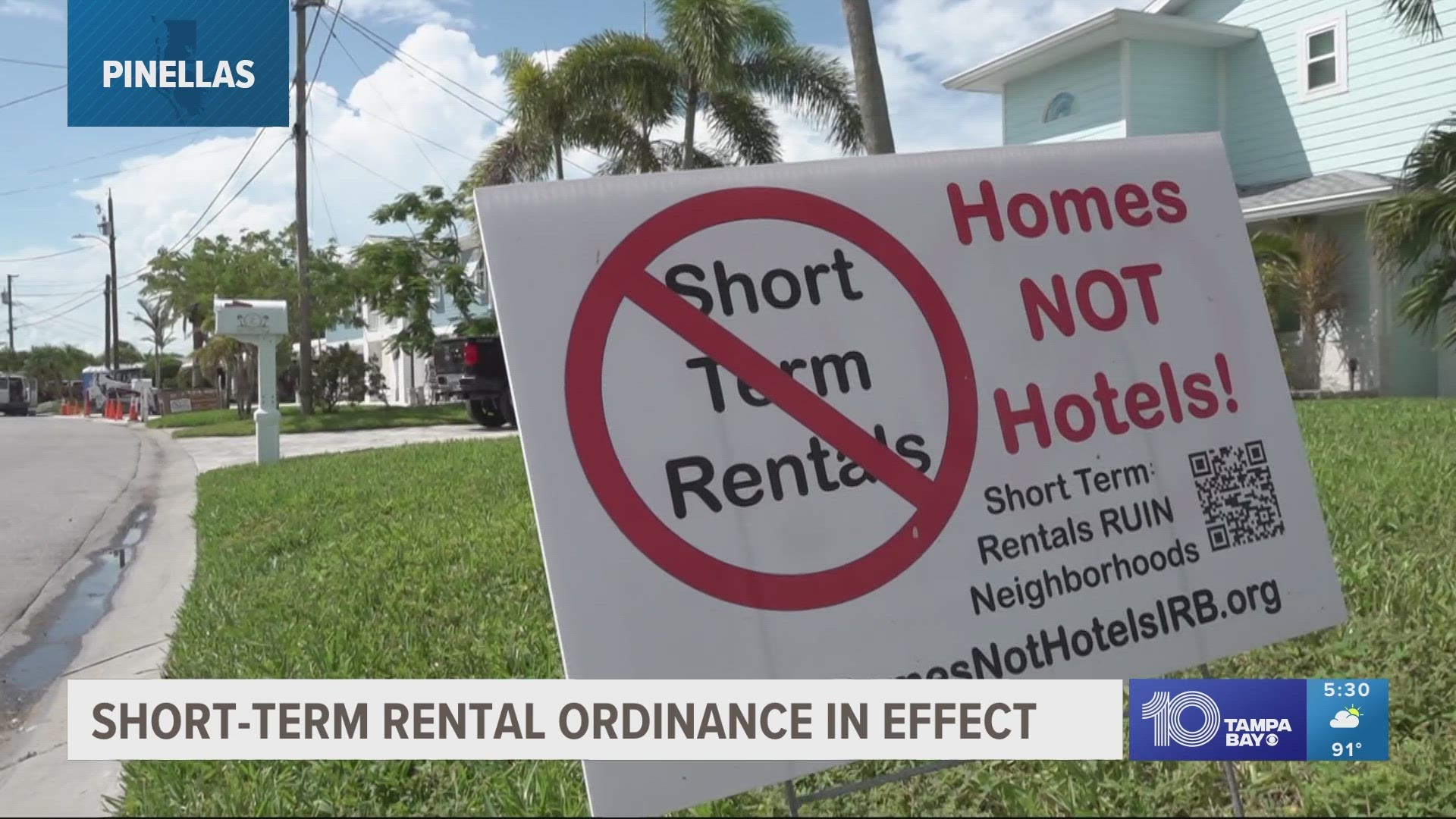INDIAN ROCKS BEACH, Fla. — Starting Tuesday, a new ordinance regulating short-term rentals is now in effect for Indian Rocks Beach. The local law sets new policies on parking, occupancy, noise levels and building code requirements.
Indian Rocks Beach is a small community located in the middle of Sand Key. With just over two miles of beach, it's become a destination for people visiting from near and far.
"The reason we moved here was because it was a quaint, quiet, friendly neighborhood," John Pfanstiehl said.
Pfanstiehl has lived in Indian Rocks Beach for 32 years. He said the neighborhoods have changed so much that he hardly knows his neighbors.
"They didn't come to sit down and read a book," Pfanstiehl said when speaking about the tourists who visit. "They came to party. They're off work. How many of them are drug dealers? How many of them are child molesters?"
Now, under the new ordinance, short-term rentals can have no more than two guests per bedroom plus an additional two guests. There is a maximum of 12 guests allowed, regardless of how many bedrooms there are.
There must be one parking space per bedroom.
Homes used for short-term rentals must be up to the Florida Building Code, regardless of when it was built.
Those in favor of short-term rental units in Indian Rocks Beach point to the economic impact tourism has in the city. For the people who have lived there for decades, they say it's not as impactful as you may think.
"If you take a look at the number of restaurants that were in Indian Rocks Beach 15 years ago, it was about 20," Pfanstiehl said. "There's about 20 of them today. And as you leave the neighborhood, you'll see [a] short-term residence where they have four complete garbage cans out there full to the brim... when they spend $2,000 a night or more to stay at a big place that sleeps 16, they're making their food there, they aren't going out to restaurants."
These ordinance changes only impact short-term rental owners. They do not apply to homeowners who live in their homes full-time.
"Some of the ordinances that they're putting through, I think, are just targeting us because they think we're these big investors," Alisha Harris said. "And I'm not. I'm just a regular girl that wants to spend time with their family."
Harris owns a few short-term rental homes in Indian Rocks Beach. She lives in New York now and frequently stays in Indian Rocks Beach, where she is licensed to work. Harris said she bought her short-term rentals in Indian Rocks to offer families a vacation experience hotels can't provide.
She knows bad short-term rental guests happen in any city with Airbnb and VRBOs.
"But those need to be taken care of on an individual basis," Harris said. "And I don't like the fact that I'm trying to enhance Indian Rocks Beach. Yet, I feel like I'm I have a target on my back."
This week, Harris and more than 300 other short-term rental owners and small business owners are filing a lawsuit against the city of Indian Rocks Beach. The goal of the lawsuit is to get the entire ordinance repealed.
The city of Indian Rocks Beach will not comment on pending or potential litigation, its office said in an email statement last week.
"Our family is invested, not even to make money," Harris explained. "We're invested because we love Indian Rocks just as much as residents."
Some long-time residents aren't returning that love. Pfanstiehl wants to see short-term rentals banned entirely from the residentially zoned portion of the city.
"We're not against short-term rental owners," he said. "They are not supposed to be in residential neighborhoods. So we're fine with short-term rentals and commercial tourist districts."
He said the new ordinance doesn't go far enough.
"It's like a growing cancer, the short-term rentals that are here are bringing so many transients in," Pfanstiehl said. "They're bringing so much disruption. It has entirely changed the nature of this once peaceful, beautiful town."
Since the city began more heavily enforcing noise concerns and parking, from April to July of this year, 48 noise complaints were made. No citations were issued, according to the Pinellas County Sheriff's Office. In that same time frame, 318 parking citations were made.
Malique Rankin is a general assignment reporter with 10 Tampa Bay. You can email her story ideas at mrankin@10tampabay.com and follow her Facebook, Twitter, and Instagram pages.

